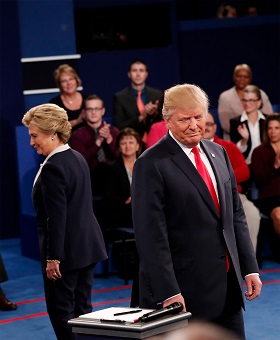On the eve of the US presidential elections, Chatham House, Britain’s leading analytical center on international relations, published an article by Flynt Leverett, professor of the University of Pennsylvania, titled US Election Note Middle East Policy After 2016. Leverett dwells on the future of the US Middle East policies. Leverett, a former member of the National Security Council and of the CIA, paints a fairly worrying picture of Washington soon reconsidering its policies in favor of “interventionism and confrontation,” yet a close study of his own arguments produces a rather ambiguous picture.
On the eve of the US presidential elections, Chatham House, Britain’s leading analytical center on international relations, published an article by Flynt Leverett, professor of the University of Pennsylvania, titled US Election Note Middle East Policy After 2016. Leverett dwells on the future of the US Middle East policies. Leverett, a former member of the National Security Council and of the CIA, paints a fairly worrying picture of Washington soon reconsidering its policies in favor of “interventionism and confrontation,” yet a close study of his own arguments produces a rather ambiguous picture.
Barack Obama’s Legacy
Leverett’s article is interesting both as a manifestation of his own views of the future US Middle Eastern policies and as an assessment of Barack Obama’s political legacy, that is, of the current situation in the region.
Leverett believes that the current President’s key achievement is reducing the American presence in the region. Indeed, Obama has nominally kept his promise and withdrew American military units from Iraq before the end of 2011. However, a complete withdrawal failed to materialize, and the story of American military intervention in the region is far from complete.
The US military is still present in Iraq in the advisor capacity, and their numbers could be considered reduced only in comparison to the times of George W. Bush (for instance, in June 2007, 170,000 American troops were stationed in Iraq). On the whole, the American military presence is still significant (6,400 troops as of September 2016, plus about 8,000 private contractors). Moreover, due to the need to fight IS, the American military presence is growing, which became particularly obvious in the fall of 2016 as the operation intended to clear Mosul of jihadists was drawing nearer.
Leverett’s claim that Obama’s presidency saw a change in the US relations with Israel and Saudi Arabia is questionable. Israel has been and remains the US’ main ally in the region, as is clearly proven by the agreement signed in September to give Israel $38 billion in military aid. The onlything that suffered is the relations between the countries’ leaders. President Obama and Israel’s Prime Minister Benjamin Netanyahu dislike each other and make no particular effort to hide it. The US President had already avoided (under a specious excuse) meeting the Israeli Prime Minister during his US visits, and in May 2016 Netanyahu himself cancelled his visit to Washington in order to avoid meeting with Obama. Yet one can confidently claim that this is a temporary situation, and things will change upon Obama’s departure from the White House, especially since both presidential candidates tirelessly profess their support for Israel.
The same is true about the US–Saudi Arabia relations. Seeing as during President Obama’s latest visit the Saudi king did not greet him in the airport (it is consistent with the diplomatic protocol, but spurred a lively debate in the media), Riyadh is not enthusiastic about the current President. Riyadh cannot forgive him either flirting with the Muslim Brotherhood and betraying America’s old ally, Egypt’s President Hosni Mubarak, or concluding the nuclear deal with Iran. Yet one assumes that both countries clearly understand that they cannot get away from each other, they have too many common interests.
It turns out it is too early to claim the US has undermined its relations with its regional allies, yet the Iraq problem is still there – America withdrew only to return, and there appeared new sources of trouble in Syria and Libya. And these challenges are far more serious than “Iran’s continued rise” and “Russia’s expanding role” in the Middle East that Leverett chose to draw his readers’ attention to.
In reality, Obama’s successor will have to rack their brains over the ways of getting out of the Middle Eastern morass and not just withdrawing the troops in one fell swoop, as it were. In order to do that, the US will have to solve the region’s problems (primarily the Jihadism problem), and the US will hardly succeed without cooperation with Iran and Russia, the two countries Leverett scares his readers with.
Interventionist vs. Realist
In Leverett’s assessment, Hillary Clinton, as the establishment’s candidate, will attempt to preserve the US primacy in the region, and her arrival in the White House will usher in the new era of liberal interventionism. It will primarily manifest in a revised policy on Syria: the US will expand its military intervention in Syria, it will support the opposition more actively, and it will even create no-fly zones to protect the opposition from Russia and Syria’s air forces.
It appears that Leverett does not consider the consequences of the steps he believes Clinton is ready to take. What no-fly zones could we be talking about if Syria’s air space is controlled by Russia’s air force and even Israelis try not to fly there without Moscow’s approval? Does Clinton need an open conflict with Moscow that will bring her no political dividends?
Expanding America’s intervention and support for the opposition is also very questionable, since the US has no one to rely on in Syria besides the Kurds. Any other pro-American opposition will have to be created from scratch, and that takes both time and money. Given the negative results of the previous attempt, Clinton will hardly decide to repeat the same mistake.
Together with stepping up action in Syria, the US will carry out the policy of containing Iran (apparently, we are talking new sanctions linked to Iran’s missile program), which entails setting a course for changing the regime in Tehran. This approach will bring only increased tension in the US–Iran relations and in the region as a whole.
It is hard to believe in the US reaching the same level of trust with the Gulf countries as Leverett predicts for Clinton’s presidency. This is simply impossible since Riyadh has already seen that the Democrats are quite capable of abandoning their allies to their fate, and it will insure itself against possible risks.
Donald Trump and the Dream of Pragmatism
Unlike Hillary Clinton, Donald Trump doubts whether the big Middle Eastern game is worth it, since it does not promise any economic or political benefits; on the contrary, it promises only expenses. At the same time, judging by his campaign speeches, he clearly sees the threats coming to America from the Middle East, yet he is far from having expensive ambitions.
A pragmatic billionaire, as Trump bills himself, with his “America first” slogan, is less tied to the US’ traditional allies, Israel and Saudi Arabia, protecting and supporting whom has become a burden for the US tax payers. It has already led people to call him a neoisolationist. Yet allowing for an exaggerated campaign rhetoric and adjusting the Republican’s promises accordingly, we simply get the President who speaks against intervening in any emerging crises. Obama aimed for something similar when he tried to minimize America’s participation in overthrowing Libya’s dictator Muammar Gaddafi. This is bad news for Europe (and Leverett presents the European point of view).
Trump is not concerned about Russia’s military presence in Syria as he thinks that the Russian air force does some of the work Americans would have to do otherwise. His idea of cooperating with Russia in Syria (defeating IS is more important than overthrowing Bashar al-Assad) looks far more realistic than the confrontational policy of pushing Moscow out of the Middle East that Clinton effectively declares.
Leverett depicts Trump as an opponent of the regime change policy (thereby de facto contradicting his own statement that interventionism will be on the rise whatever the elections’ outcome). Yet it is hardly possible to say that should Trump win, the US foreign policy will be stripped of its ideological component. Thus far, the US recent history did not know a single pragmatic president for it would require reconsidering the US’ very place in the world, and this is not an easy step even for politicians who enjoy their party’s unanimous support. Therefore, Trump’s chances of remaining pragmatic are slim. Should he be elected, he will either have to compromise with the Republican establishment and Congress, or have to reckon with the public opinion which thus far is not ready to part with the ideas of America being the exceptional nation and similar concepts. Leverett hints at it rather directly, when he says that George W. Bush also initially campaigned with a program that was far from interventionist and then circumstances forced him to become a hawk.
Trump’s anti-Muslim rhetoric Leverett mentions could indeed enhance the anti-American sentiments of the average Arabs. Yet here Washington does not stand to lose anything: regular Arabs do not like the US anyway, and some regimes (such as Egypt) even use those sentiments to their advantage. At the same time, Arab leaders did not care for the public opinion when it came to receiving aid or military support from Washington.
It is unlikely that Trump will renegotiate Iran’s nuclear deal (it is difficult without support from the other members of the Six), yet his promises concerning the development of economic ties with Tehran look quite convincing, especially if American companies see the dividends cooperation with Iran will bring after the sanctions are lifted entirely.
Obama’s Unexpected Successor
At the end of his report, Leverett arrives at the conclusion that the US policies in the Middle East will become “more interventionist and more confrontational”; in particular, the US will increase its pressure on Iran, and the crisis in Syria will escalate.
However, a close study of Leverett’s arguments reveals a somewhat paradoxical picture. The reader gets the impression that Leverett’s predictions will come true only in respect to Clinton’s presidency (containing Iran, stepping up action in Syria, returning to previous alliances), while Trump will essentially continue Obama’s policies as he is expected to crush terrorists, scale back the US intervention in the region, decrease expenses and in general introduce a sort of “reset” in the US–Russia relations (if only in the Middle East).







